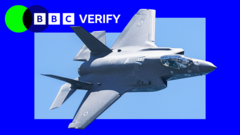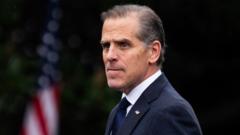In a significant development following recent military strikes, Iran and E3 diplomats held talks in Istanbul, emphasizing dialogue amidst escalating constraints and challenges.
**Renewed Diplomatic Efforts as Iran and E3 Discuss Nuclear Program**

**Renewed Diplomatic Efforts as Iran and E3 Discuss Nuclear Program**
European powers engage with Iran amid heightened tensions and signals of willingness to negotiate.
Iranian officials convened with diplomats from the United Kingdom, Germany, and France at Iran's consulate in Istanbul for the first substantial discussions on the nuclear program since the onset of a military conflict triggered by Israeli strikes on Iranian nuclear sites. This conflict, which began in June, escalated into a 12-day war involving U.S. military strikes, subsequently halting previously ongoing U.S.-Iran nuclear dialogues.
With a deadline set for late August, the three European nations—collectively known as the E3—have made it clear that they may reimplement sanctions against Iran should progress toward a new nuclear agreement not be achieved. Iranian Deputy Foreign Minister Kazem Gharibabadi characterized the talks as "serious, frank, and detailed," expressing a commitment to continue consultations moving forward. He has voiced strong opposition to the imposition of sanctions, labeling them as "completely illegal."
The diplomatic tension finds root in the 2015 nuclear accord that initially lifted sanctions on Iran, which has long been accused of covertly pursuing nuclear weapon capabilities—a claim Iran staunchly denies. The terms of the original agreement required Iran to restrict its nuclear activities and permit international inspections. However, the withdrawal of the United States from the agreement in 2018 marked a significant turning point, as it reinstated harsh sanctions that prompted Iran to increasingly breach the established limits.
As negotiations began, Rafael Grossi, Director General of the International Atomic Energy Agency (IAEA), noted Iran's readiness to engage in technical discussions regarding its nuclear program and underscored the necessity for transparency in its operations. He called for a constructive dialogue emphasizing Iran’s position on safeguarding its facilities.
Iran's Foreign Ministry spokesman Esmaeil Baghaei reiterated that the E3 countries should use this opportunity to atone for what he described as previous unproductive policies and accused them of supporting unlawful actions. Tensions peaked in June when Iran's parliament suspended cooperation with the IAEA amidst aggression from U.S. and Israeli forces. This sparked continued confrontations, including missile and drone responses from Iran to Israeli attacks.
The E3's emphasis on urgent progress denounces any further delays, while Iran remains adamant in addressing the underlying causes of escalated mistrust and conflict in the region. With negotiations open and a shared goal of de-escalation, both sides will need to navigate the complex landscape toward a potential agreement.
With a deadline set for late August, the three European nations—collectively known as the E3—have made it clear that they may reimplement sanctions against Iran should progress toward a new nuclear agreement not be achieved. Iranian Deputy Foreign Minister Kazem Gharibabadi characterized the talks as "serious, frank, and detailed," expressing a commitment to continue consultations moving forward. He has voiced strong opposition to the imposition of sanctions, labeling them as "completely illegal."
The diplomatic tension finds root in the 2015 nuclear accord that initially lifted sanctions on Iran, which has long been accused of covertly pursuing nuclear weapon capabilities—a claim Iran staunchly denies. The terms of the original agreement required Iran to restrict its nuclear activities and permit international inspections. However, the withdrawal of the United States from the agreement in 2018 marked a significant turning point, as it reinstated harsh sanctions that prompted Iran to increasingly breach the established limits.
As negotiations began, Rafael Grossi, Director General of the International Atomic Energy Agency (IAEA), noted Iran's readiness to engage in technical discussions regarding its nuclear program and underscored the necessity for transparency in its operations. He called for a constructive dialogue emphasizing Iran’s position on safeguarding its facilities.
Iran's Foreign Ministry spokesman Esmaeil Baghaei reiterated that the E3 countries should use this opportunity to atone for what he described as previous unproductive policies and accused them of supporting unlawful actions. Tensions peaked in June when Iran's parliament suspended cooperation with the IAEA amidst aggression from U.S. and Israeli forces. This sparked continued confrontations, including missile and drone responses from Iran to Israeli attacks.
The E3's emphasis on urgent progress denounces any further delays, while Iran remains adamant in addressing the underlying causes of escalated mistrust and conflict in the region. With negotiations open and a shared goal of de-escalation, both sides will need to navigate the complex landscape toward a potential agreement.



















